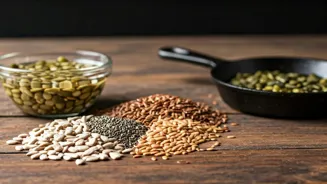Seed Consumption Methods
The preparation method significantly impacts the nutritional benefits of seeds. Raw seeds offer a natural state, preserving enzymes and nutrients. Soaking
seeds, especially nuts and legumes, helps reduce phytic acid, an antinutrient that can hinder mineral absorption. Roasting seeds enhances flavor and texture, making them more palatable, and can also increase the availability of some nutrients. However, roasting at high temperatures can diminish the levels of some heat-sensitive vitamins and healthy fats. Each method presents unique advantages, making the choice dependent on individual preferences and health goals. Consider trying different preparation methods to see what suits your taste and digestive comfort. Experiment with all three to find your preferred way to eat seeds.
Raw Seed Advantages
Eating seeds raw allows you to enjoy their natural state, preserving many heat-sensitive nutrients. Raw seeds retain their full enzymatic profile, which can aid in digestion. Raw consumption is ideal for those who prioritize maximum nutrient retention and enjoy the natural flavors of seeds. The absence of processing maintains the integrity of the healthy fats and oils present in the seeds. Furthermore, eating seeds raw avoids the potential nutrient loss that might occur with heating or roasting. This method is simple and straightforward: just grab a handful of your favorite seeds and enjoy the natural crunch and flavor they offer. It is the easiest way to consume seeds.
Soaking Seed Benefits
Soaking seeds is an effective way to improve their digestibility and nutrient bioavailability. This process involves submerging seeds in water for a period, often overnight, which activates enzymes and reduces phytic acid. Phytic acid, present in many seeds, can bind to minerals like iron, zinc, and calcium, reducing their absorption. Soaking helps neutralize this compound, making it easier for the body to absorb these essential minerals. The process of soaking softens the seeds, making them easier to chew and digest. Soaked seeds can also have a milder flavor and a creamier texture. Experimenting with different soaking times and temperatures can help you find what works best for your preferences and seed types.
Roasting Seed Delights
Roasting seeds is a popular method that enhances their flavor and texture. Roasting develops a more intense, nutty taste and a satisfying crunch. Roasting can also make seeds easier to digest for some individuals. The heat of roasting can alter the structure of the seeds, which might break down some compounds that can interfere with nutrient absorption. However, high-temperature roasting may degrade certain heat-sensitive nutrients. Roasting seeds allows for the incorporation of various spices and seasonings, providing a wider range of flavor profiles. Experiment with different temperatures and seasonings to create a perfect, flavor-packed snack.
Ideal Seed Timing
There isn't a single 'best' time to eat seeds that applies universally to everyone. However, consuming seeds strategically can support digestive health and nutrient absorption. Many experts suggest eating seeds with meals. Adding seeds to meals aids in slowing down digestion due to their high fiber content, which keeps you feeling full for longer. Eating seeds in the morning or as a snack can provide sustained energy throughout the day. For those focused on gut health, incorporating seeds with probiotic-rich foods such as yogurt can boost the synergistic effects. Listen to your body and adjust when and how often you consume seeds based on how you feel and your personal dietary needs. Find what works best for your body and your lifestyle.
Seeds and Gut Health
Seeds are a fantastic source of fiber, contributing significantly to a healthy gut microbiome. Fiber feeds beneficial gut bacteria, promoting a balanced and thriving ecosystem. Different types of seeds offer varying levels of both soluble and insoluble fiber, each playing a distinct role in digestive health. Soluble fiber helps regulate blood sugar levels and can aid in lowering cholesterol, while insoluble fiber helps add bulk to the stool, preventing constipation. Seeds also contain prebiotics, which further support the growth of good bacteria. Consuming seeds regularly contributes to reducing inflammation and improving overall digestive function. Consider incorporating a variety of seeds to reap the full spectrum of benefits for your gut health.














